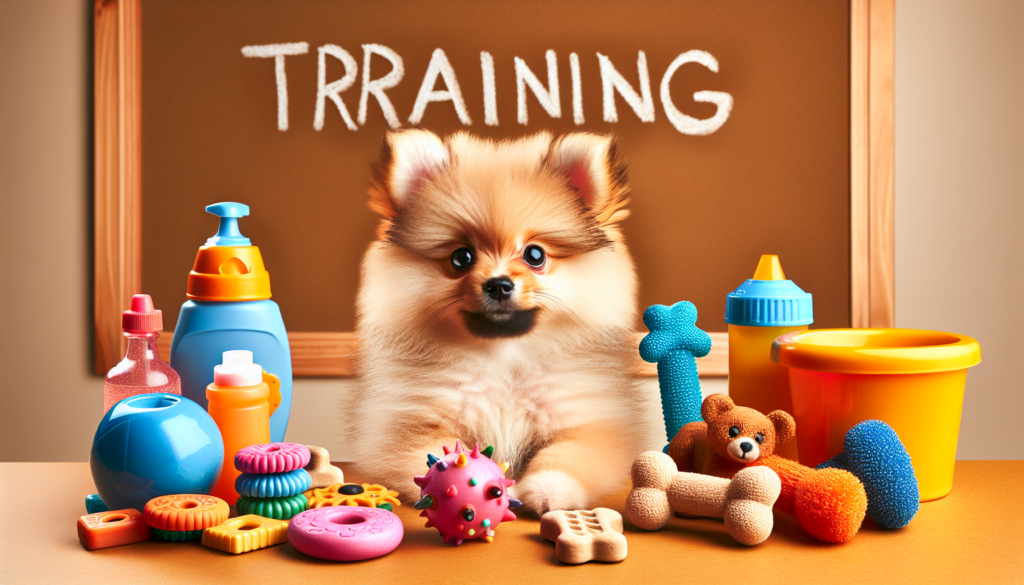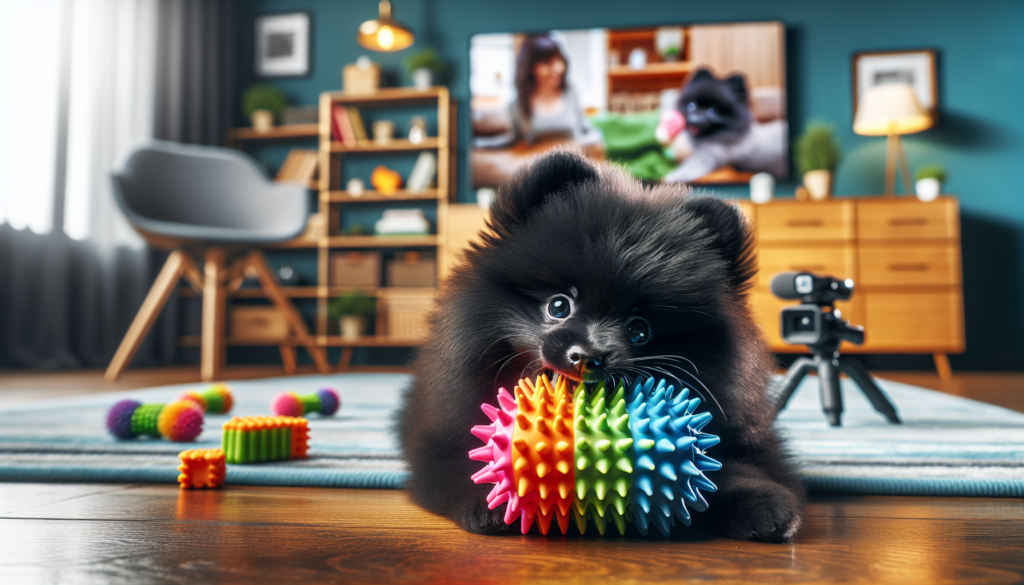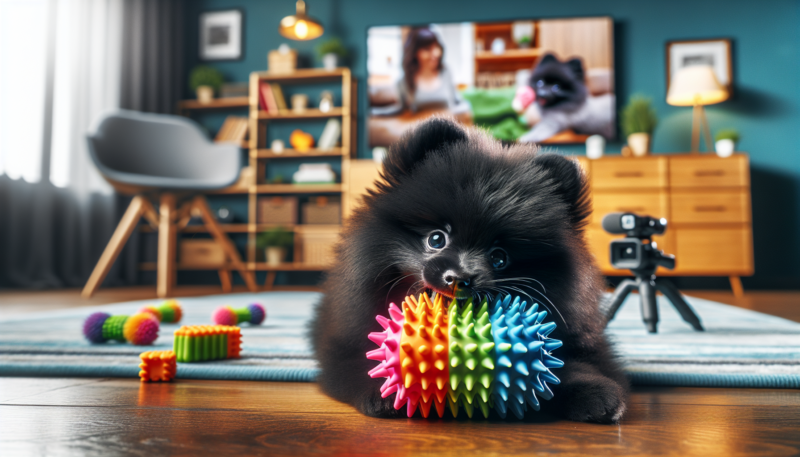If you’ve recently brought home a delightful Pomeranian puppy, you may have noticed their playful nature includes an occasional nibble on your fingers or toes. While this behavior may seem harmless now, it’s important to address it early on to prevent any potential problems in the future. In this article, we’ll provide you with some helpful tips to stop your Pomeranian puppy from biting, so you can enjoy a peaceful and tooth-free playtime with your adorable furry friend.

Understanding Why Pomeranian Puppies Bite
Teething
One of the main reasons why Pomeranian puppies tend to bite is because of teething. Just like human babies, puppies go through a teething phase where their baby teeth start to fall out and their adult teeth come in. During this process, their gums can become sore and itchy, causing them to chew on anything to relieve the discomfort. That’s why they often resort to biting, even on your hands or fingers.
Exploration
Puppies are naturally curious creatures, and biting is one way for them to explore their surroundings. They use their mouths to investigate different objects and textures, including your hands and feet. They are not doing this to intentionally hurt you; rather, they are trying to understand the world around them through their sense of touch. It’s important to teach them appropriate ways to explore without resorting to biting.
Playfulness
Pomeranian puppies are known for their playful nature, and biting is often a part of their play behavior. They might nip or bite during games as they try to engage with you or their fellow playmates. While this behavior is generally harmless, it’s essential to establish boundaries and teach them that biting is not acceptable during playtime.
Attention-seeking
Pomeranian puppies are social creatures and crave attention from their owners. If they feel ignored or want to grab your attention, they may resort to biting as a way to communicate their needs. It’s crucial to address their need for attention in a positive manner while discouraging biting as a means to get your focus.
Providing Sufficient Exercise
Physical activities
To prevent excessive biting, it’s important to ensure that your Pomeranian puppy gets enough physical exercise. Engage them in activities that will tire them out and expend their excess energy. Daily walks, play sessions in the park, or games of fetch can help them release their pent-up energy, making them less likely to resort to biting out of boredom.
Mental stimulation
In addition to physical exercise, Pomeranians also need mental stimulation to keep them mentally engaged and satisfied. A bored or understimulated puppy is more likely to resort to destructive behaviors, including biting. Provide them with puzzle toys, interactive games, or obedience training sessions to challenge their minds and prevent them from turning to biting for stimulation.
Creating a Safe Environment
Puppy-proofing your home
Creating a safe environment is crucial for the well-being of your Pomeranian puppy and can help reduce the incidence of biting. Puppy-proof your home by removing any hazardous items or objects that they could potentially chew on and swallow. Keep electrical cords out of their reach, secure toxic substances, and make sure there are no small items lying around that they could choke on.
Using gates or playpens
To prevent biting incidents, you can also use gates or playpens to create a safe, confined area for your Pomeranian puppy while you’re unable to supervise them closely. Limiting their access to certain areas of the house can help you control their behavior, prevent accidents, and gradually introduce them to different parts of the home while they learn appropriate behavior.
Establishing Consistent Rules
Positive reinforcement
Establishing consistent rules and boundaries is crucial for your Pomeranian puppy’s training and behavior. Use positive reinforcement techniques to reward and encourage good behavior. Whenever your puppy exhibits non-biting behavior, such as licking or gentle playing, offer praise, treats, or affection. This will help them understand which behaviors are desirable and increase the likelihood of them repeating those actions.
Clear boundaries
Clearly communicate what is acceptable and unacceptable behavior to your Pomeranian puppy. Consistently enforce rules such as not biting or nipping, and redirect their attention to appropriate toys or activities whenever they show signs of biting. Be patient and persistent in teaching them the boundaries, and keep in mind that consistency is key to their learning process.
Redirecting biting behavior
When your Pomeranian puppy tries to bite, do not engage in rough play or encourage the behavior. Instead, redirect their biting instinct onto appropriate chew toys or interactive toys. Whenever they bite or nip at you, gently replace your hand with a toy and praise them when they interact with the toy instead. Consistently redirecting their biting behavior will help them understand that toys are for biting, not people.

Socializing Your Pomeranian Puppy
Exposing to different people and animals
Socializing your Pomeranian puppy at an early age is essential to ensure they grow up to be well-rounded and friendly dogs. Introduce them to various people, including family members, friends, and strangers, to help them feel comfortable around different individuals. Also, expose them to other friendly dogs, under controlled circumstances, to teach them proper socialization skills and discourage aggressive behavior.
Puppy classes or playdates
Enroll your Pomeranian puppy in puppy classes or arrange playdates with other puppies to further enhance their socialization skills. These settings provide controlled environments where they can interact with other dogs and learn acceptable play behaviors. Working with a professional trainer or attending supervised play sessions can also help address any biting tendencies and provide valuable guidance in managing their behavior.
Training with Basic Commands
Sit
Teaching your Pomeranian puppy the command “sit” not only helps establish basic obedience but also provides an alternative behavior to biting. Start by holding a treat close to their nose and slowly lift it above their head. As their head follows the treat, their bottom should lower naturally into a seated position. Immediately praise and reward them with the treat. Practice this command regularly to reinforce the behavior and divert their attention from biting.
Stay
The “stay” command is an important skill for your Pomeranian puppy to learn, as it helps control impulsive behavior, including biting. Begin by having your puppy sit, then give the command “stay” while holding your hand up as a visual cue. Gradually increase the duration of the stay, rewarding them with treats and praise for successfully staying still. Practicing this command regularly will help them learn impulse control and prevent biting during moments of excitement.
Leave it
Teaching the command “leave it” is vital to prevent your Pomeranian puppy from biting or ingesting harmful objects. Start by placing a treat on the ground and covering it with your hand. When they show interest in the covered treat, give the command “leave it” and wait for them to shift their attention away from it. As soon as they redirect their attention, reward them with a different treat. Consistency and practice will reinforce this command and discourage biting or mouthing inappropriate items.
Drop it
Training your Pomeranian puppy to “drop it” is useful when they have something in their mouth that they shouldn’t, such as your hand or a forbidden object. Begin with a toy or safe item that they enjoy playing with. As they hold onto it, offer them a treat in exchange for dropping the toy. Reward them with praise and another toy or treat. This command helps redirect their biting tendencies onto appropriate objects and reinforces positive behavior.
Using Chew Toys and Treats
Selecting appropriate chew toys
Providing your Pomeranian puppy with appropriate chew toys is essential to redirect their biting behavior onto acceptable items. Look for toys that are specifically designed for teething puppies, such as rubber or nylon toys. Avoid toys with small parts that can be easily chewed off and swallowed. Additionally, consider toys that offer different textures and provide relief for their teething discomfort.
Providing dental treats
Dental treats can serve as a distraction for your Pomeranian puppy when they feel the urge to bite. These treats not only help redirect their chewing instincts but also promote healthy teeth and gums. Look for dental treats that are specifically designed for puppies, as they are softer and more suitable for their young teeth. Offering these treats during their teething phase can provide relief and discourage biting.
Using interactive toys
Interactive toys, such as treat-dispensing toys or puzzle toys, can keep your Pomeranian puppy mentally engaged while redirecting their biting behavior. These toys require them to figure out how to access treats or solve puzzles, providing a healthy outlet for their natural curiosity and chewing needs. By keeping their minds occupied and mouths busy, interactive toys can help prevent boredom-induced biting.
Avoiding Negative Reinforcement
Avoid punishment
Punishing your Pomeranian puppy for biting can have adverse effects and lead to fear or aggression. Physical punishment or yelling can cause them to become anxious or defensive, making the biting behavior worse. Instead, focus on positive reinforcement and redirection techniques to discourage biting. Consistently rewarding good behavior and redirecting their attention away from biting will yield better, long-term results.
Ignoring biting behavior
When your Pomeranian puppy bites, it’s important not to react dramatically or give them excessive attention. Reacting with a loud yelp or pulling your hand away abruptly may inadvertently encourage them to bite more. Instead, stay calm and withdraw your attention for a few moments. This teaches them that biting results in the loss of attention, which is not desirable for social puppies seeking interaction.
Consulting a Professional Trainer
Getting expert advice
If you’re struggling to address your Pomeranian puppy’s biting behavior, a professional dog trainer can provide valuable guidance and support. They have the experience and expertise to assess the specific needs of your puppy and tailor a training plan to address their biting tendencies effectively. A trainer can also help identify any underlying issues that may be contributing to the biting behavior.
In-person or online training sessions
Professional trainers offer various training options to address your Pomeranian puppy’s biting behavior. In-person training sessions allow for personalized guidance and hands-on assistance. Alternatively, online training sessions provide convenient access to expert advice and guidance from the comfort of your own home. Explore these training options to find the one that best suits your needs and helps you establish a bite-free environment for your puppy.
Conclusion
Addressing and preventing biting behaviors in Pomeranian puppies requires a combination of understanding the reasons behind the behavior and implementing consistent training techniques. By providing sufficient exercise, creating a safe environment, setting clear rules, socializing them, and using positive reinforcement, owners can effectively manage and redirect biting tendencies. With patience, consistency, and professional guidance if needed, you can raise a well-behaved and bite-free Pomeranian puppy. Remember, tackling biting behavior early on will lead to a happy and healthy relationship with your furry companion.
